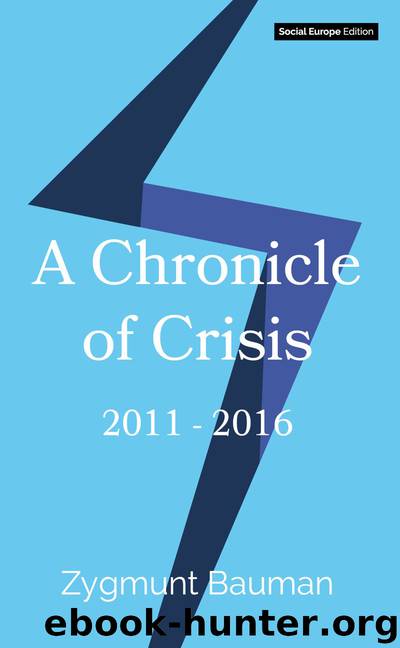A Chronicle of Crisis by Zygmunt Bauman

Author:Zygmunt Bauman
Language: eng
Format: epub
Publisher: Social Europe Edition
Life elsewhere
So, according to Jean Pralong, the youngsters would rather bear with their dreary plight however off-putting that plight might be, were they allowed to stay longer in their quasi-jobs. But seldom are they, and if they are they would not know how long the stay of execution could last. One way or another, members of Generation Y differ from their predecessors by complete or almost complete absence of job-related illusions, by a lukewarm only (if any) commitment to the jobs currently held and the companies which offer them, and a firm conviction that life is elsewhere and resolution (or at least a desire) to live it elsewhere. This is indeed an attitude seldom to be found among the members of the ‘boom’ and ‘X’ generations.
Some of the bosses admit that the guilt is on their side. They are reluctant to lay the blame for the resulting disenchantment and nonchalance prevalent among young employees on the youngsters themselves. Brafman quotes Gilles Babinet, a 45 year-old entrepreneur, bewailing the dispossession of the young generation of all or nearly all autonomy their fathers had and successfully guarded – priding themselves on possessing the moral, intellectual and economic principles of which their society was presumed to be the guardian and from which it wouldn’t allow its members to budge. He believes that the kind of society which Generation Y enters is on the contrary anything but seductive: if I was their age, Babinet admits, I’d behave exactly as they do.
As for the youngsters themselves, they are as blunt as their predicament is straightforward: we have not the slightest idea, they say, what tomorrow is likely to bring. The labour market closely guards their secrets – just as impenetrable fortresses do: little point in trying to peep inside, let alone attempting to break the gates open. And as to the guessing of its intentions – it’s hard to believe that there are any. Tougher and more knowledgeable minds than mine are known mostly for their abominable misjudgments in the guessing game. In a hazardous world, we have no choice but being gamblers. Whether by choice, or by necessity; and it does not matter in the end by what, does it?
Well, these state-of-the-mind reports are remarkably similar to the confessions of the more thoughtful and sincere among the precarians – members of the precariat, the most rapidly growing section of our post-credit-collapse and post-certainty world. Precarians are defined by having their homes erected (complete with bedrooms and kitchens) on quicksand, and by their own self-confessed ignorance (‘no idea what is going to hit me’) and impotence (‘even if I knew, I wouldn’t have the power to divert the blow’).
It has been thought until now that the appearance and formidable, some say explosive, expansion of the precariat, sucking in and incorporating more and more of the past working- and middle-classes, was a phenomenon arising from the fast changing class structure. It is indeed – but isn’t it, in addition, also a matter of a changing generational
Download
This site does not store any files on its server. We only index and link to content provided by other sites. Please contact the content providers to delete copyright contents if any and email us, we'll remove relevant links or contents immediately.
| Anthropology | Archaeology |
| Philosophy | Politics & Government |
| Social Sciences | Sociology |
| Women's Studies |
Nudge - Improving Decisions about Health, Wealth, and Happiness by Thaler Sunstein(7692)
The Fire Next Time by James Baldwin(5431)
iGen by Jean M. Twenge(5408)
Adulting by Kelly Williams Brown(4565)
The Sports Rules Book by Human Kinetics(4379)
The Hacking of the American Mind by Robert H. Lustig(4375)
The Ethical Slut by Janet W. Hardy(4242)
Captivate by Vanessa Van Edwards(3838)
Mummy Knew by Lisa James(3686)
In a Sunburned Country by Bill Bryson(3536)
The Worm at the Core by Sheldon Solomon(3486)
Ants Among Elephants by Sujatha Gidla(3460)
The 48 laws of power by Robert Greene & Joost Elffers(3246)
Suicide: A Study in Sociology by Emile Durkheim(3018)
The Slow Fix: Solve Problems, Work Smarter, and Live Better In a World Addicted to Speed by Carl Honore(3007)
The Tipping Point by Malcolm Gladwell(2914)
Humans of New York by Brandon Stanton(2868)
Handbook of Forensic Sociology and Psychology by Stephen J. Morewitz & Mark L. Goldstein(2692)
The Happy Hooker by Xaviera Hollander(2686)
